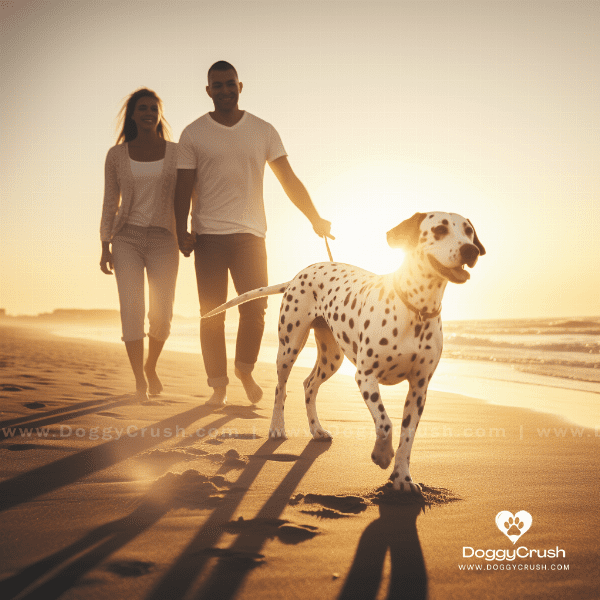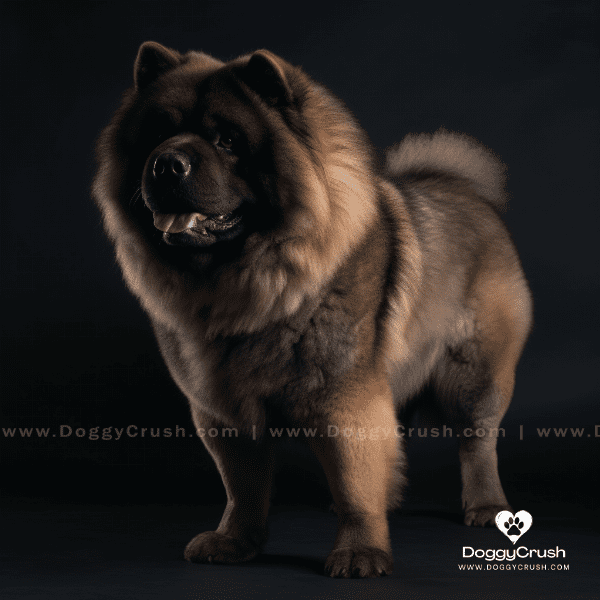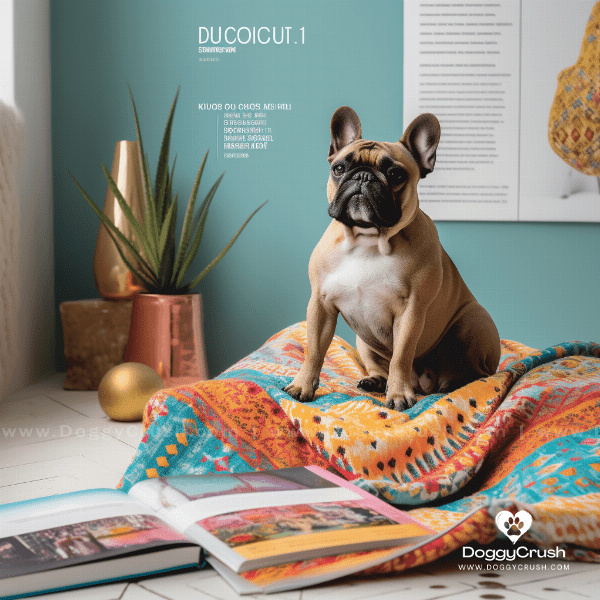Table of Contents
- History and Origin of Dalmatian Dogs
- Physical Characteristics and Appearance
- Temperament and Personality Traits
- Grooming and Care for Your Dalmatian
- Training and Exercise for Dalmatians
- Health Issues Common to Dalmatians
- Feeding and Nutrition for Dalmatians
- Dalmatians as Family Pets
- Choosing the Right Dalmatian for Your Lifestyle
History and Origin of Dalmatian Dogs
Dalmatian dogs are believed to have originated from the region that is now modern-day Croatia, where they were bred as carriage dogs. Their primary role was to accompany horse-drawn carriages, acting as guards and providing companionship to the horses.
Ancestry and Evolution
The exact ancestry of the Dalmatian dog is uncertain, but it is believed to have descended from ancient breeds, such as the Molossian Hound and the Pointer. Over time, the Dalmatian was crossbred with various other breeds, resulting in the development of the modern-day Dalmatian dog.
Purpose and Function
The Dalmatian’s primary purpose was to run alongside horse-drawn carriages, protecting the horses and carriage from stray dogs and highwaymen. They would also serve as an early warning system, alerting the carriage driver to any potential danger.
Popularity and Recognition
Dalmatians gained popularity as companion dogs in the 19th century and quickly became a fixture in upper-class households. In 1888, the first Dalmatian breed club was formed in England, and the breed was officially recognized by the American Kennel Club in 1888.
Role in Popular Culture
Dalmatians have been featured in popular culture for many years, particularly in the famous Disney movie, “101 Dalmatians.” This movie sparked a surge in demand for Dalmatians, which unfortunately led to an increase in irresponsible breeding and health issues within the breed.
Today, Dalmatians continue to be popular pets, known for their intelligence, athleticism, and affectionate nature. However, it is important to remember their history and function as carriage dogs and to provide them with adequate exercise and mental stimulation to ensure their health and happiness.
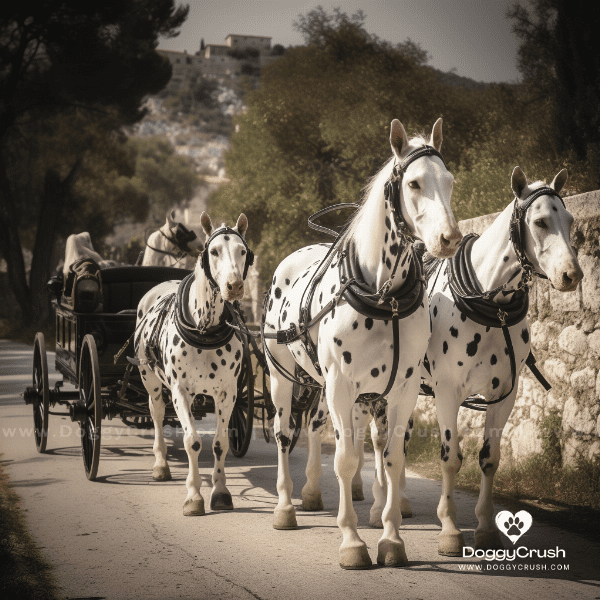
Physical Characteristics and Appearance
Dalmatians are medium-sized dogs with a unique, spotted coat and a muscular build. Their distinctive appearance makes them easily recognizable and popular among dog enthusiasts worldwide.
Size and Proportions
The Dalmatian breed is typically between 19 to 24 inches tall at the shoulder and weighs between 45 to 70 pounds, with males being slightly larger than females. They have a square-shaped body and a sleek, athletic build, making them well-suited for their original purpose as carriage dogs.
Coat and Color
Dalmatians have a short, dense coat that is white with black or liver-colored spots. Their spots can vary in size and shape, and each dog’s pattern is unique. While Dalmatians are best known for their black-spotted coats, they can also have liver-colored spots, which are less common.
Head and Facial Features
Dalmatians have a distinctive head shape with a broad skull and long, tapered muzzle. They have expressive, almond-shaped eyes that are usually dark brown or blue. Their ears are set high and are triangular in shape, pointing forward and slightly to the side.
Tail and Limbs
Dalmatians have a long, tapering tail that is usually carried high and curved slightly upwards. Their limbs are muscular and well-proportioned, with strong bones and well-arched feet.
Overall, the Dalmatian’s physical characteristics and appearance make it a unique and striking breed. While their distinctive spots are what set them apart from other breeds, their athletic build and expressive features make them an excellent companion for families who enjoy an active lifestyle.
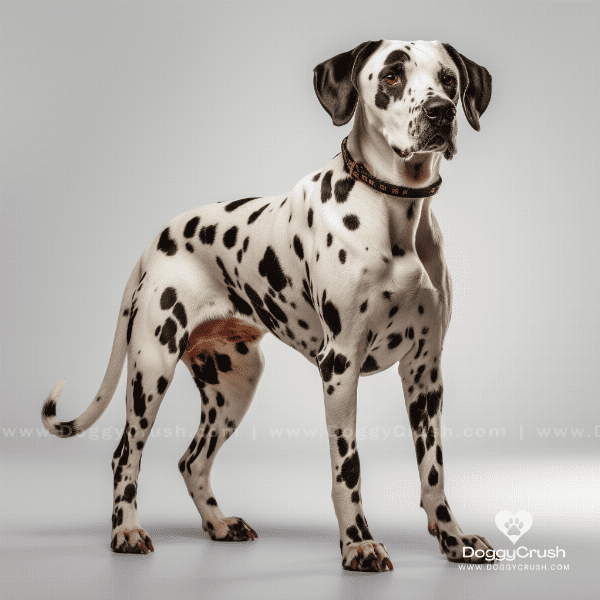
Temperament and Personality Traits
Dalmatians are known for their friendly, outgoing nature and are often described as playful and energetic. They are highly social dogs that thrive on human companionship and love to be the center of attention.
Affectionate and Loyal
Dalmatians are known for their affectionate and loyal nature. They form strong bonds with their owners and are fiercely protective of their families. They are happiest when they are with their humans and can become anxious or destructive if left alone for long periods.
Energetic and Playful
Dalmatians are highly energetic dogs that require daily exercise and mental stimulation. They love to play and are always up for a game of fetch or a run in the park. Their high energy levels make them excellent companions for active families or individuals.
Intelligent and Trainable
Dalmatians are intelligent dogs that are quick to learn new things. They respond well to positive reinforcement training methods and thrive on mental stimulation. They are also natural problem-solvers and enjoy a challenge.
Alert and Protective
Dalmatians have a strong protective instinct and will alert their owners to any potential danger. They are excellent watchdogs and will bark to warn their family of intruders or suspicious activity.
Social and Kid-Friendly
Dalmatians are social dogs that get along well with other pets and children. They are patient and tolerant with kids and make excellent family pets. However, it is important to supervise interactions between young children and Dalmatians to prevent any accidental injuries.
Overall, the Dalmatian’s friendly, outgoing nature and playful personality make it an excellent companion for families and individuals who enjoy an active lifestyle. With proper socialization and training, Dalmatians can make loyal and loving pets for years to come.

Grooming and Care for Your Dalmatian
Coat Care
Dalmatians have short, dense coats that shed moderately throughout the year. They do not require frequent baths, and a bath every few months is usually sufficient to keep them clean. However, they do require regular brushing to remove loose hair and prevent matting. A slicker brush or rubber curry brush can be used to remove dead hair and distribute natural oils throughout the coat.
Skin Care
Dalmatians are prone to skin allergies and irritations, so it is important to keep their skin clean and dry. Regular bathing and grooming can help prevent skin issues, but it is also important to keep an eye out for any signs of redness, itching, or irritation. If you notice any issues, consult with your veterinarian for appropriate treatment.
Nail Care
Dalmatians’ nails grow quickly and require regular trimming to prevent them from becoming too long and causing discomfort. A good rule of thumb is to trim your Dalmatian’s nails every two to three weeks, depending on their rate of growth. If you are uncomfortable trimming your dog’s nails yourself, a professional groomer or veterinarian can assist you.
Dental Care
Dental hygiene is important for your Dalmatian’s overall health. Brushing their teeth regularly can help prevent tartar buildup and bad breath. You can also provide dental chews or toys to help keep their teeth clean.
Exercise and Nutrition
Regular exercise is important for your Dalmatian’s physical and mental health. Aim for at least 30 minutes of exercise per day, which can include walks, runs, or playtime in a fenced-in yard. Additionally, a balanced and nutritious diet is essential to maintain their health and prevent obesity-related health issues.
Overall, taking care of a Dalmatian requires some basic grooming and care, but they are generally low-maintenance dogs. With proper care and attention, your Dalmatian can be a happy and healthy companion for many years.
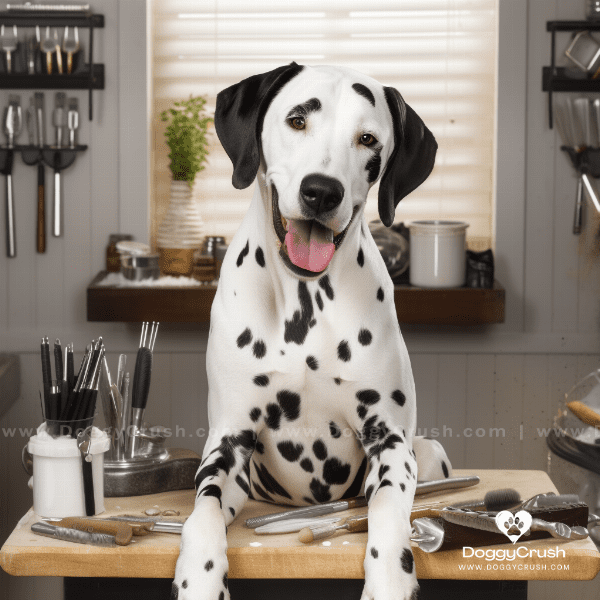
Training and Exercise for Dalmatians
Dalmatians are intelligent and energetic dogs that require regular exercise and mental stimulation. Proper training is also essential to help them develop good behavior and obedience.
Socialization
Socialization is critical for Dalmatians, particularly during their puppyhood. Introducing your Dalmatian to new people, animals, and environments can help them become well-adjusted and confident adults. Puppy socialization classes and visits to dog parks can be helpful for socialization.
Obedience Training
Dalmatians are intelligent and eager to please, making them easy to train with positive reinforcement methods. Basic obedience training, such as sit, stay, come, and heel, is essential to ensure good behavior and obedience in your Dalmatian.
Exercise
Dalmatians require daily exercise to keep them healthy and happy. They are a high-energy breed that needs plenty of physical activity, such as brisk walks, runs, or playtime in a fenced-in yard. Without adequate exercise, Dalmatians can become bored and destructive.
Mental Stimulation
In addition to physical exercise, Dalmatians also need mental stimulation to prevent boredom and destructive behavior. Activities such as puzzle toys, interactive games, and obedience training can provide the mental stimulation that they need.
Crate Training
Crate training is an effective way to house train your Dalmatian and provide them with a safe space to rest and relax. A properly sized crate should be used, and your Dalmatian should be gradually introduced to the crate with positive reinforcement training.
Overall, training and exercise are essential for a happy and healthy Dalmatian. With proper socialization, obedience training, and plenty of physical and mental activity, your Dalmatian can be a well-behaved and beloved companion for many years.
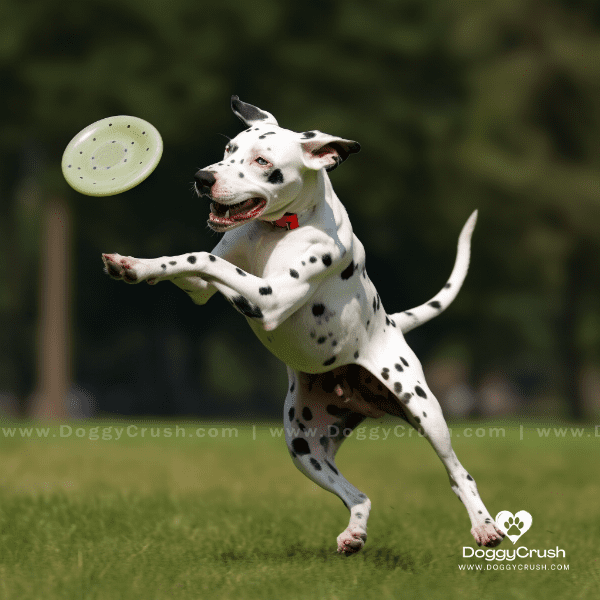
Health Issues Common to Dalmatians
Dalmatians are generally healthy dogs, but like all breeds, they are prone to certain health issues. It is important to be aware of these health issues and take steps to prevent or manage them.
Deafness
Deafness is a common issue among Dalmatians, with up to 30% of the breed being affected. Deafness in Dalmatians is usually genetic and can be present at birth or develop over time. Regular hearing tests can help identify any hearing loss early on, and training methods that rely on visual cues can be helpful for deaf Dalmatians.
Urinary Tract Issues
Dalmatians are known for their tendency to develop urinary tract issues, such as bladder stones or urinary blockages. This is due to their unique metabolism, which can result in the formation of urate crystals in their urine. A diet that is low in purines and high in water can help prevent these issues.
Allergies
Dalmatians are prone to allergies, particularly skin allergies that can cause itching, redness, and irritation. Allergies can be caused by a variety of factors, including food, pollen, dust, or flea bites. Regular grooming and bathing can help prevent skin allergies, and your veterinarian can recommend allergy medications or treatments if necessary.
Hip Dysplasia
Hip dysplasia is a common orthopedic issue among many Dog breeds, including Dalmatians. This condition occurs when the hip joint does not develop properly, resulting in arthritis and pain. Regular exercise, a healthy diet, and proper weight management can help prevent hip dysplasia.
Eye Issues
Dalmatians can be prone to a variety of eye issues, such as cataracts, glaucoma, and progressive retinal atrophy. Regular eye exams and preventative care can help identify any issues early on and prevent further complications.
Regular veterinary checkups and preventative care can help ensure that your Dalmatian remains healthy and happy. By being aware of the common health issues in Dalmatians and taking steps to prevent or manage them, you can help your furry friend live a long and healthy life.
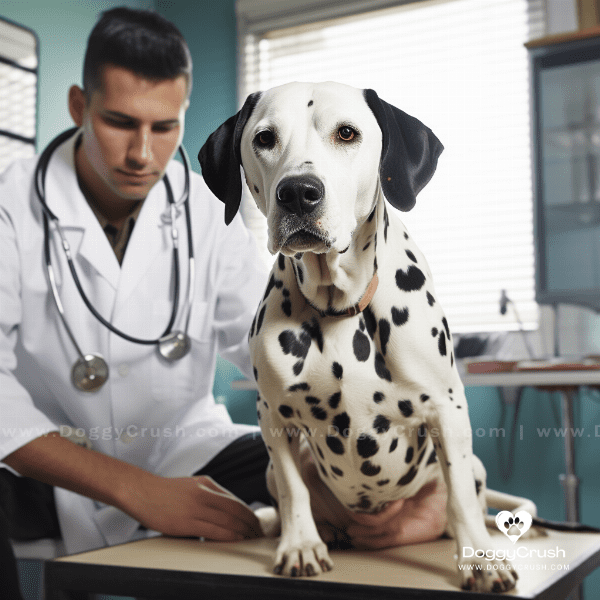
Feeding and Nutrition for Dalmatians
Proper nutrition is essential for your Dalmatian’s overall health and well-being. Feeding a balanced and nutritious diet can help prevent health issues and keep your Dalmatian healthy and active.
Nutritional Requirements
Dalmatians require a diet that is high in protein and low in purines to prevent the formation of urate crystals in their urine. A diet that is low in purines can help prevent urinary tract issues, which are common in this breed. Consult with your veterinarian to determine the appropriate diet and feeding schedule for your Dalmatian.
Feeding Schedule
Dalmatians should be fed twice a day, with meals evenly spaced throughout the day. A consistent feeding schedule can help prevent overeating and obesity-related health issues.
Water Intake
Dalmatians are prone to urinary tract issues, so it is essential to ensure that they are drinking enough water. Providing fresh, clean water at all times can help prevent dehydration and urinary tract issues.
Treats and Table Scraps
Treats and table scraps should be given in moderation to prevent weight gain and other health issues. Avoid giving your Dalmatian foods that are high in purines, such as organ meats, as they can increase the risk of urinary tract issues.
Weight Management
Maintaining a healthy weight is essential for your Dalmatian’s overall health and can help prevent obesity-related health issues. Regular exercise and a balanced diet can help keep your Dalmatian at a healthy weight.
Overall, providing your Dalmatian with a balanced and nutritious diet can help prevent health issues and ensure that they remain healthy and active. By following a consistent feeding schedule and providing fresh water and nutritious food, you can help your furry friend live a long and healthy life.

Dalmatians as Family Pets
Dalmatians are popular family pets known for their friendly, outgoing nature and playful personalities. They make excellent companions for active families who enjoy spending time outdoors and engaging in physical activity.
Good with Children
Dalmatians are patient and tolerant with children, making them an excellent choice for families with young kids. However, it is important to supervise interactions between children and dogs to prevent any accidental injuries. Dalmatians also enjoy playing with children and can keep them entertained for hours.
Good with Other Pets
Dalmatians are generally good with other pets, including cats and other dogs, particularly if they are socialized early on. Proper introductions and gradual introductions can help prevent any issues and ensure that your Dalmatian gets along well with other pets.
Active Lifestyle
Dalmatians are a high-energy breed that requires daily exercise and mental stimulation. They are well-suited for active families who enjoy spending time outdoors and engaging in physical activity. Regular exercise can also help prevent behavior issues and keep your Dalmatian healthy and happy.
Loyalty and Protection
Dalmatians are fiercely loyal to their families and will go to great lengths to protect them if necessary. They make excellent watchdogs and will alert their owners to any potential danger. However, they are not aggressive dogs and will usually only bark to warn their family of potential threats.
Affectionate and Playful
Dalmatians are known for their affectionate and playful personalities. They enjoy spending time with their owners and love to be the center of attention. They also have a playful streak and enjoy playing games, such as fetch or tug-of-war.
Overall, Dalmatians make excellent family pets for active families who enjoy spending time outdoors and engaging in physical activity. With proper socialization, training, and care, they can be loyal and loving companions for many years to come.
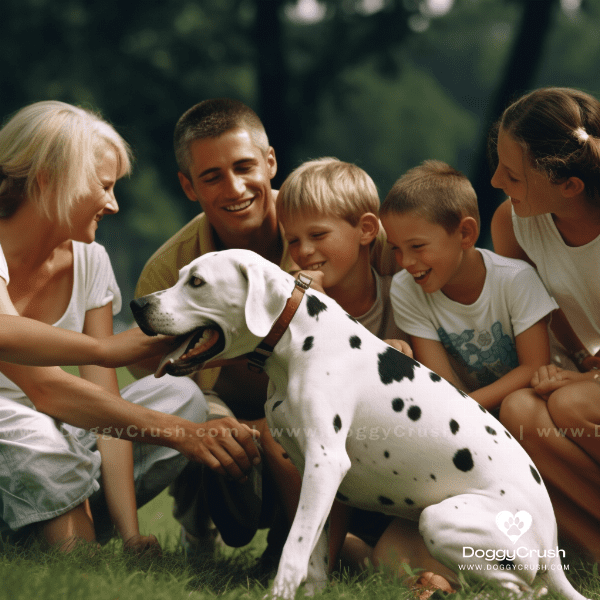
Choosing the Right Dalmatian for Your Lifestyle
When choosing a Dalmatian, it is important to consider your lifestyle and the unique needs of the breed. Here are some factors to consider when choosing the right Dalmatian for your lifestyle:
Activity Level
Dalmatians are a high-energy breed that requires daily exercise and mental stimulation. If you are an active person who enjoys spending time outdoors and engaging in physical activity, a Dalmatian may be a good match for you. However, if you have a more sedentary lifestyle or are unable to provide daily exercise, a Dalmatian may not be the best fit.
Space
Dalmatians are relatively large dogs that require space to move around and play. If you live in a small apartment or have a limited amount of space, a Dalmatian may not be the best fit. They are well-suited for homes with a fenced-in yard or plenty of space to run and play.
Time Commitment
Dalmatians require time and attention from their owners to thrive. They are social dogs that crave human companionship and can become anxious or destructive if left alone for long periods. If you have a busy schedule or are unable to provide adequate time and attention to your Dalmatian, a different breed may be a better fit.
Grooming and Care
Dalmatians are relatively low-maintenance when it comes to grooming, but they do require regular brushing and care to keep their coat healthy and their skin free from irritation. If you are unable to provide regular grooming and care, a Dalmatian may not be the best fit.
Health Issues
Dalmatians are prone to certain health issues, such as deafness and urinary tract issues. If you are considering a Dalmatian, it is important to be aware of these health issues and take steps to prevent or manage them.
Overall, choosing the right Dalmatian for your lifestyle requires careful consideration and research. By considering your activity level, space, time commitment, grooming and care, and health issues, you can make an informed decision and choose a Dalmatian that will be a great fit for you and your family.
